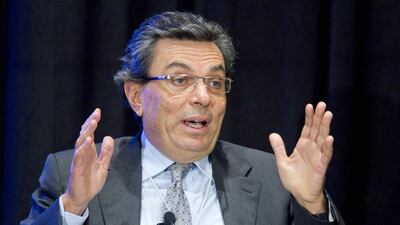The oil services company Petrofac yesterday reported poor first-half financial results, but promised there was better to come as a record order book and delayed projects pay off.
The London-listed company has operations in Abu Dhabi and Sharjah. Its shares have been under pressure since last spring, when delays to some projects – particularly its Laggan-Tormore gas plant project in Shetland, UK – caused it to warn of lower profits.
The chief executive Ayman Asfari said that the first half of this year was the company’s most successful in terms of gaining new orders. For the engineering and construction side of the business, orders grew by 35 per cent in the period, or US$7.2 billion, to stand at more than $20bn at the end of June.
Nevertheless, Petrofac’s revenue was down 11 per cent in the first half, at $2.5bn, and net profit slumped 44 per cent, to $136 million. But the company promised that revenue and profit for the full year would be “significantly weighted toward the second half of the year”.
Mr Asfari said that among developments that will help turn financial performance around is the $3.7bn project to develop the Upper Zakum oilfield on four artificial islands in Abu Dhabi. It is partnering with Mubadala and Daewoo Shipbuilding on Upper Zakum, which is a venture between Adnoc, ExxonMobil and Japan Oil Development. Petrofac estimates its share of the contract at $2.9bn.
On the flipside, one of the biggest headaches for the company in the first half has been weather-related delays in its $825 million contract on the Laggan-Tormore gas plant, which is owned by Total. Mr Asfari lamented that operating there has been more challenging than other experiences the company has had operating in more traditionally hostile environments.
Interestingly, though, he added that Petrofac “has had opportunities to operate in Iraq, in the northern part of Iraq, but we have avoided that and stayed just in the south. We’ve avoided Libya too and I think we’ve been proved right on that”.
Despite the reassurances from the chief executive, Petrofac’s shares fell after the results – they were down 14p late in the London trading day, at 1,113p and have not recovered since May, when they fell 16 per cent from the year’s high of 1,463p after the initial profits warning.
An ongoing problem for Petrofac has been the inevitable hit on its cashflow from the delays on contracts. This can be exacerbated when dealing with national oil companies, which make up a large portion of Petrofac’s business. Mr Asfari said that additional delays on payments from some projects were because of company bureaucracy rather than disputes – he cited the bureaucracy of Mexico’s Pemex as an example of this, which was a factor in the first half of this year.
One move the company has made to try to address the issue is a $1.25bn deal with First Reserve, an energy infrastructure investment bank. The venture, PetroFirst, which was announced at the end of June, will give Petrofac the ability to remove certain assets from its balance sheet and free up capital, thus allowing it to focus on its core business, especially in its service-providing units which have experienced logjams in the past. This is a key measure “to address the issue of share price weakness”, Mr Asfari said.
Mr Asfari said that the full order book – in which $1.2bn has been added since the end of the first half – was a reflection of continued high spending projects undertaken by national oil companies in the Middle East and elsewhere, although he admitted there has been pressure on costs as oil prices have slipped this year.
amcauley@thenational.ae

